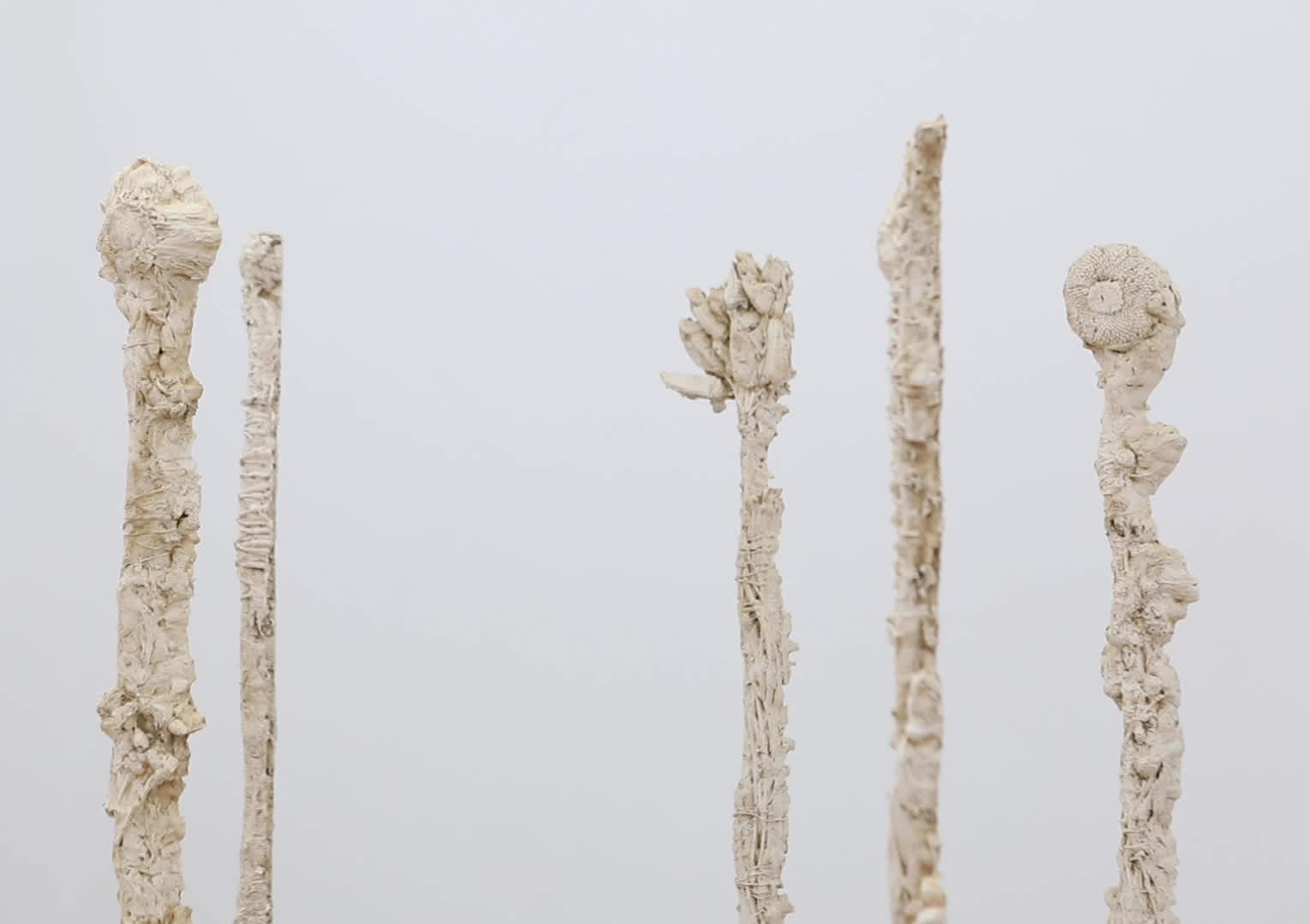'We infill plants with meaning for many reasons; they remind us of people we've loved or times in our lives. Guard seeks to remind us of the stubbornness of life, the human ability to evolve and adapt and ultimately our desire to survive.' - Jodie Carey Edel Assanti is pleased to present Guard, Jodie Carey's fifth solo exhibition at the gallery. A site-specific installation of 150 jesmonite sculptures mounted on steel supports stretches across the entirety of the two ground floor galleries, articulating a serpentine path through the space. Carey produced her latest installation employing a technique called earth-casting: wrapping...
"We infill plants with meaning for many reasons; they remind us of people we've loved or times in our lives. Guard seeks to remind us of the stubbornness of life, the human ability to evolve and adapt and ultimately our desire to survive." - Jodie Carey
Edel Assanti is pleased to present Guard, Jodie Carey's fifth solo exhibition at the gallery. A site-specific installation of 150 jesmonite sculptures mounted on steel supports stretches across the entirety of the two ground floor galleries, articulating a serpentine path through the space.
Carey produced her latest installation employing a technique called earth-casting: wrapping plants with cloth and thread, the artist created slender, delicate sculptures that are then pressed into the earth's surface to form a rudimentary mould. The wrapped plants are then removed, and jesmonite is poured into the remaining imprint in the soil. Pale in colour, the resulting sculptures reveal traces of fabric, leaves, stones, and roots with a hauntingly exquisite level of detail.
Exploring notions of ritual and mortality, the tall, elegant uprights evoke the timelessness of standing stone monuments or an army of sentinels, silently registering the passage of time. The subtle tonalities that result from Carey's distinctive process emphasise the sculptures' faceted surfaces, revealing their elemental form whilst embodying a sense of impermanence.
Carey's recent work has explored culturally universal art-making methods including carving, weaving, and wall-drawing. Through revisiting age-old techniques, Carey's oeuvre emphasises the relationship between object making and commemoration, looking to the physical world as a repository of material memory. Diverting from the history of monumental sculpture, Carey's work belongs to a female British sculptural tradition that emphasises object-experience and materiality over image-making. Choosing to work with fragile and ephemeral materials, her installations challenge the permanence and solidity traditionally associated with the medium.
Flowers have been a recurring motif throughout Carey's practice. Earlier works comprised elaborate flower arrangements and bouquets unexpectedly fabricated out of newspapers that have been soaked or dusted with blood, bone or ash. "Flowers are strongly linked to cultural identity and so quickly become synonymous with conflict and atrocity around the world", Carey notes. "Most recently the sunflower for Ukraine became an instantly recognisable symbol of support. But flowers have always grown amongst the devastation of war. Poppies, carnations, forget-me-knots are all historically bound to conflict and remembrance. We think of these flowers beyond their seasons."
Referring to soil as the skin of the earth, Carey's interest in soil as a material is born out of its essential relationship to life and simultaneous ability to embody death. Its complex constitution combines minerals, water, air and the decaying matter of once-living things. In this way, Guard continues Carey's engagement with concepts of entropy and time, emphasising the universal human urge to commemorate our lives by making an impression on our surroundings.
As part of London Gallery Weekend, Jodie Carey will be in conversation at Edel Assanti with Joseph Constable, Head of Exhibitions at the De La Warr Pavilion, on Friday 31 May, 12-1pm.
Jodie Carey's exhibition 'Beyond the Matrix', supported by Brookfield Properties x AWITA (Association of Women in the Arts), is on view at 100 Bishopsgate until September 2024 (more information here).





